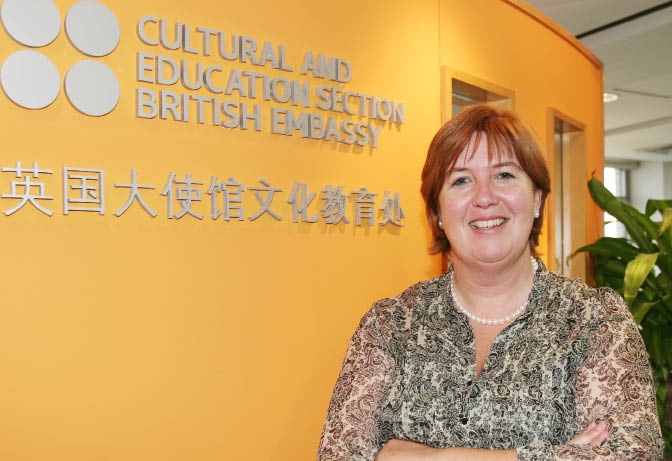From Britain with Love
The British Council and Four Decades of Deepening Cultural and Educational Ties
By staff reporters VAUGHAN WINTERBOTTOM & ZHANG HUI
|
 |
| Joanna Burke, Cultural Counselor of the Cultural and Education Section of British Council. |
WITH a commitment to a step change in the range and level of relations between the two countries, the People's Republic of China and the United Kingdom established diplomatic relations at the ambassadorial level on March 13, 1972. In the 40 years since, the British Council has established itself as a key facilitator of UK-China cultural and educational bilateral exchanges, and its presence in China continues to grow. To examine how the British Council is advancing cultural communications between the two nations today, China Today sits down with Joanna Burke, director and cultural counselor of the British Council in China, for an exclusive interview.
The British Council, which operates as the Cultural and Education Section of the British Embassy in China, was first present in China from 1942 to 1952, with the eminent sinologist, scientist and polymath Joseph Needham as its first director. While programs facilitating Chinese students' studying in the UK were continued throughout the 1960s and 1970s, the Council returned to operations on the mainland in 1979, which happens to be the same year Ms. Burke, a subscriber to China Today's predecessor China Reconstructs since 1975, studied as an undergraduate student in Beijing. At that time, the Beijing office of the British Council was small, with a dedicated British staff of three. Nevertheless, in this first year of renewed operations a cultural exchange agreement was signed, and 25 annual postgraduate scholarships for language students were inaugurated. These scholarships provided the basis for a broad range of exchanges in the fields of English, the arts, education and society.
Of the late 70s and early 80s, Ms. Burke says China-UK mutual understanding was limited by a lack of regular contact between the two peoples and a dearth of information on each other's contemporary affairs. Opportunities for travel between the two countries were limited. Chinese studies in the UK were largely historical in focus and Chinese anglophiles had to resort to viewing the UK through the prism of 19th English literature. "One of the main factors strengthening bilateral cultural exchanges nowadays is that people can travel and see the countries for themselves," Ms. Burke says.
Ms. Burke's first official posting to China was from 1990 to 1995 as the Assistant Director (Beijing) and Second Secretary (Cultural) of the British Embassy. She says in the early 90s a major focus of the British Council was on developing and enhancing English language education on the mainland. "We managed 30 projects in leading Chinese universities to improve the provision of English language teaching in higher education institutions. We helped in setting up English language and applied linguistics master's degree courses, developed materials and facilitated teacher training and brought in British Council English language specialists to pair with local Chinese colleagues, who would then further their study under scholarship in the UK," she says. "We also introduced an international standard for English language testing under the English Language Testing System (ELTS), which today, prefixed with 'International,' has become IELTS, the international standard for English language testing."
The 1990s also saw the genesis of the British Council's work in China in the realms of civil society, governance and law, as well as in gender issues. Pioneering academic links forged at that time are now among the most successful inter-institutional relationships that exist today.
Education Is Forever
In the last two decades the scope of British Council China's activities has broadened immensely. Since expanding from its headquarters in Beijing, the council now boasts offices in Shanghai, Guangzhou and Chongqing, from which it runs activities in 50 cities across the country. Through its Hong Kong branch, 30,000 students receive face-to-face English language instruction annually. Although teaching English falls outside the mandate of the council's branches on China's mainland, its influence still reaches learners. Ms. Burke and her team are working closely with provincial and municipal education commissions to conduct teacher-training programs throughout China. "So far 13,000 teachers have been trained through our teacher training project in Shanghai. Similar projects ran in Jiangsu and Guangdong provinces and are in development in Yunnan and Anhui."
These days, spreading the English language is merely the tip of the educational iceberg when it comes to the British Council's efforts to promote bilateral educational ties. In addition to administering the British Foreign and Commonwealth Office's prestigious Chevening Scholarships, the largest proportion of recipients by country of which come from China, as well as the Council's highly successful BOND industry work placement program, the organization continues to support and expand bilateral university and research ties. The council works closely with the Chinese Ministry of Education, and a UK China Education Framework Agreement is in place to strengthen education collaboration. China hopes to draw on international expertise in establishing world-class universities to foster domestic creativity and innovation into the future. China is interested in the UK experience in areas that contribute to that goal, such as widening access to higher education while maintaining quality, facilitating technology transfers and internationalizing university campuses
Ms. Burke says a key education imperative of the Council is to ensure the continued attractiveness of British higher education to Chinese students. Almost 300,000 Chinese students went abroad to study in 2011, and Britain hopes to maintain and expand its share of these students. Every single university in the UK has university-to-university or research links with mainland education institutions. "But what we do is much more than student recruitment," Ms. Burke points out. "We are aware that many Chinese students study in the UK in order to better their employment prospects on return to China. To this end, we work closely with HR managers in China to promote our Chinese graduates. We invite employers of leading Chinese companies to tour British campuses, and last year 85 percent of Chinese graduates from UK universities found relevant employment in China within six months of graduating. We want to ensure these benefits continue."





